Fashion Revolution Vietnam: a group of volunteers brought together through the common belief that looking good should not come at a cost to others or to the environment. We are part of a larger non-profit organisation which has a presence in over 100 countries around the world, working to demand greater transparency in the fashion industry.
Hanoi is known for its high quality tailoring, and the many skilled people able to repair clothing or footwear (that most in the Western world would now throw out and buy new, rather than take the time and money to have them fixed). With an ever-growing textile industry such skills are being lost, as Vietnam, along with so much of the world, is being whisked away on the coat-tails of fast fashion. An industry whose aim is to convince you to buy, whether you need the item or not, whether it is of good quality or not. We are encouraged not to think about where the items came from, or where they may go once we no longer need them, instead we are enticed with ‘great value’ and never-ending choice. Yet there are costs, devastating ones, that we either do not know about or choose to ignore. Fast fashion isn’t free, and someone somewhere is paying. There are now over 150 billion items of factory-made clothing produced every year, an increase from 80 billion just six years ago in 2012. An enormous 40% of these clothes are rarely or never worn.
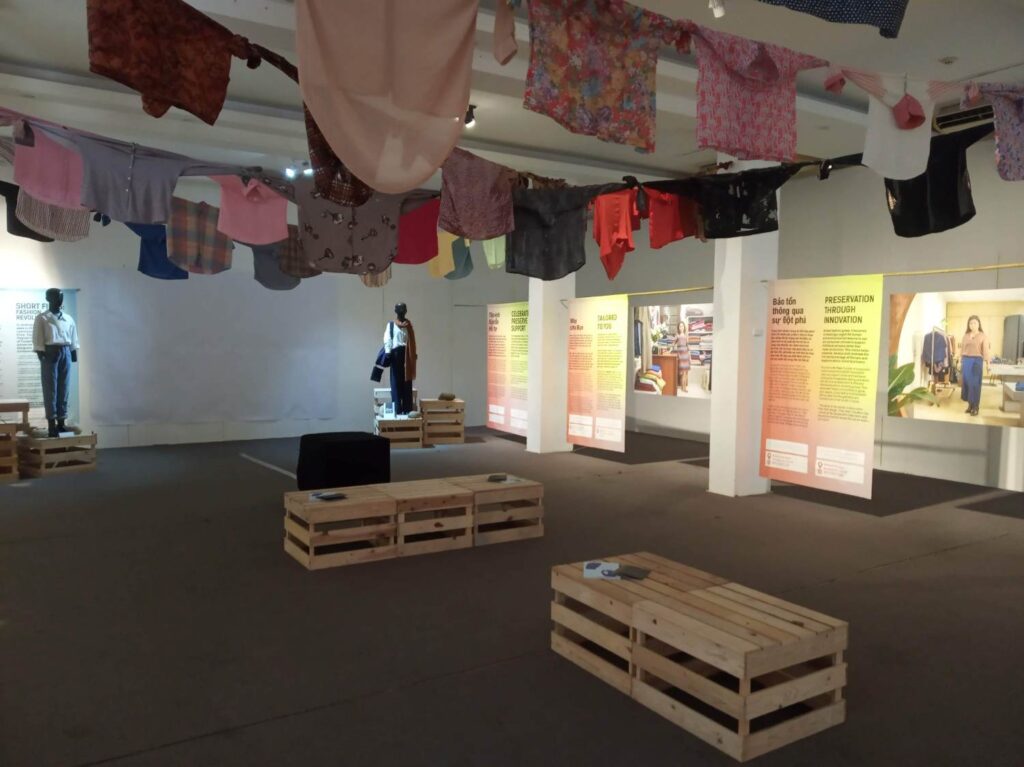
As part of a global movement to increase awareness of the consequences of the fashion industry, and to encourage people to ask the question ‘Who Made My Clothes?’ Fashion Revolution Vietnam, led by country co-ordinator Ellen Downes, hosted a week long exhibition at the Vietnamese Women’s Museum in Hanoi.
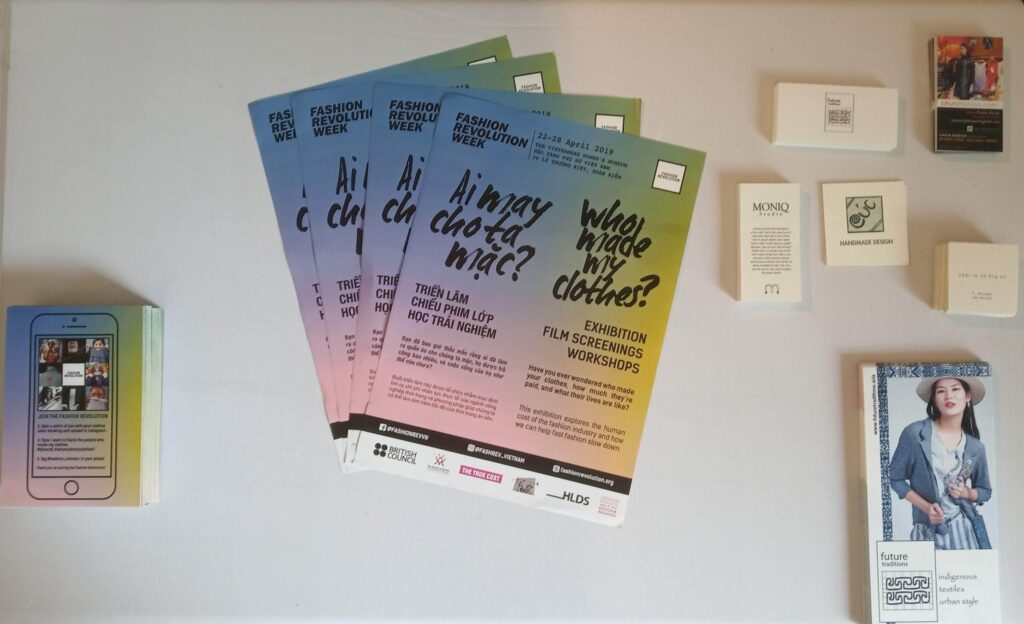
Addressing the 220 strong crowd at the launch on 22nd April, Ellen stated: ‘This is the first major Fashion Revolution event in Vietnam, so thank you everyone for coming this evening – it means so much to have your support … Fashion Revolution Day is on Wednesday and it marks the anniversary of the Rana Plaza clothing factory collapse in Bangladesh. On the 24th of April 2013 garment workers refused to go inside the factory because they knew that the building wasn’t structurally sound. But because there was such enormous pressure from the Western brands to produce orders, they were violently forced to go inside. There was a fire and the eight story factory collapsed. 2,000 workers were injured and 1,134 died that day. This exhibition is in memory of the deaths of those garment workers, and others who have lost their lives as a direct result of fast fashion.”
The exhibition hosts invited people to join us in celebrating, preserving and supporting the types of businesses in Vietnam that are so special in keeping slow fashion alive.
“You will leave armed with a set of actions you can take to support the people who made your clothes and help fast fashion slow down.” Our artist, Ellie Shipman, told the crowd.
Ellie designed artwork to evoke empathy from the audience, asking them to stand in the shoes of those who make our clothes. ‘Faceless Fashion’ is a collection of five life-size portraits, based on real people. These were ‘coloured in’ over the week as people pinned on pieces of fabric collected from tailors across the city. The artwork represented the approximately 75 million people who work to make our clothes.
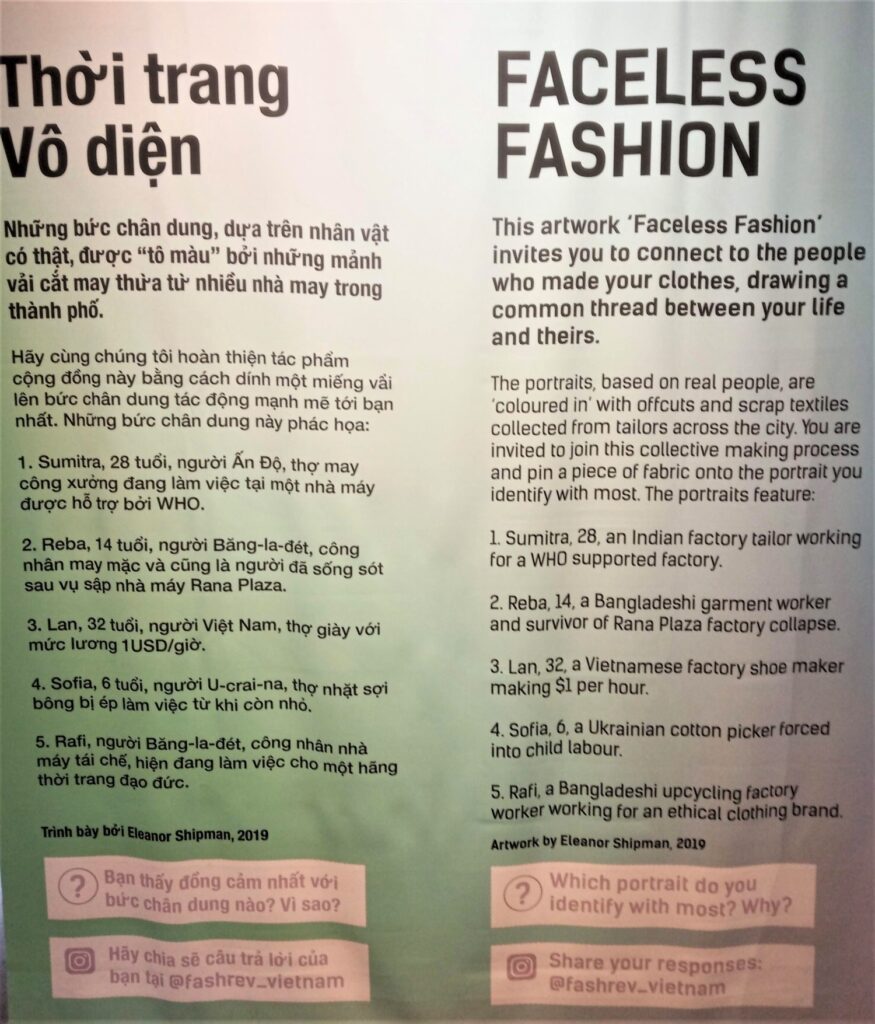
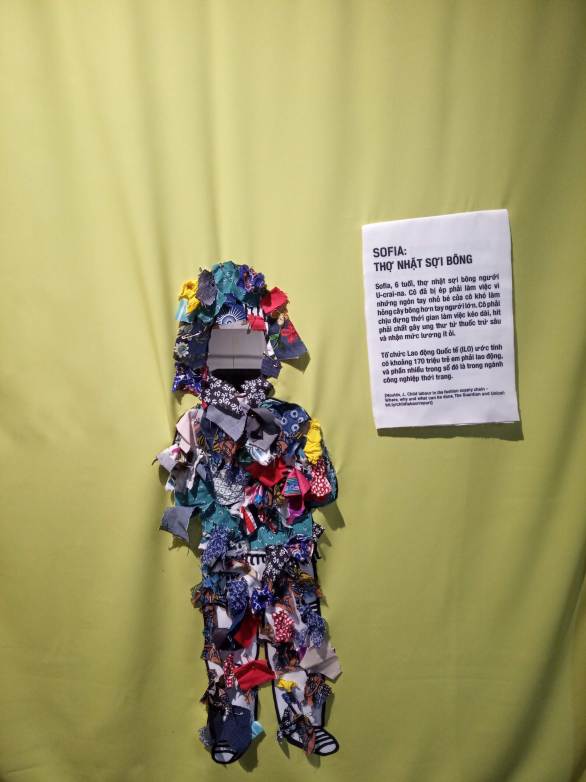
Walking into the exhibition, ears tuned to the sound of someone telling a narrative – seven short films playing on loop throughout the day, featuring inspiring stories from around the world of creatives who are leading positive change in fashion today. The films had been commissioned by the British Council.
The ceiling of the exhibition was adorned with 100 pieces of colourful clothing, used to represent the gender imbalance within the industry. 80% of garment workers worldwide are women between the ages of 18 and 35, working in factories for major fashion brands such as H&M, Zara and Bershka. Many live in poverty, work in unsafe and undignified conditions and are subject to violence. The artwork used 80 pieces of women’s clothing and 20 pieces of men’s. These were tied together to demonstrate solidarity between workers and, to show the connection to ourselves as consumers, there was an opportunity to stand at a photo station and bridge the gap between these garments. To increase awareness, and to invite brands worldwide to show transparency in their manufacturing processes, people could then post on Instagram asking ‘Who Made My Clothes?’.
Life-size photos lined the far wall, displaying information about four different women who live and work in Hanoi, all of whom are in industries key to slowing down fast fashion: Nguyễn Thoa, tailor; Vu Thao, sustainable fashion designer and founder of Kilomet109; Dieu Giap, sustainable fashion designer and founder of GIANDON; and Hong Mi, founder of vintage shop Chăn Con Công. The installation was designed to encourage a culture of ‘buy less, choose well’, and to choose a second hand store or sustainable brand over the fast fashion high street stores.
Throughout the week people continued to show their appreciation of the exhibition, and often, their surprise at some of the industry’s facts. The response suggested that if we, as consumers, truly educate ourselves on where we buy our wardrobe from, then we would make different choices. It is up to us all, as the people with the real power to exact change in the industry,to educate each other and to let our actions speak for us as we choose the path of least cost to the earth and individual lives.
To find out more visit our Instagram @fashrev_vietnam or Facebook ‘Fashion Revolution Vietnam’
Want to get involved? Email vietnam@fashionrevolution.org


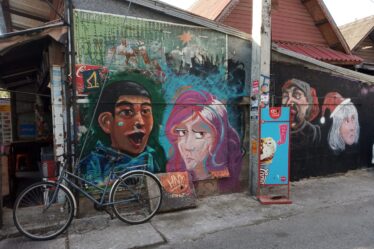
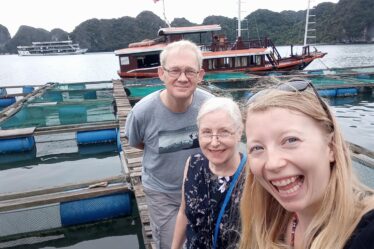
This is inspirational! I have recently seen the documentary by Stacey Dooley in Malaysia showing the effects of the chemicals running into the river from the clothing manufacturers – truly horrific…
Thanks Chris 🙂 It was a truly inspirational experience! Ah yes, I think I saw that just before I left England last year, great documentary but yes, horrifying to discover some things that happen behind the scenes. If you haven’t seen The True Cost yet, that’s a movie well worth the watch.
I will look Nicki. I am back in England now and back at work again. Finally there is some awareness dawning of the cost of our behaviour on the planet, hopefully not too late… I will look at The True Cost. Thanks for the recommendation.
Awareness seems to be spreading so yes, hopefully not too late! I look forward to hearing about your trip in detail next time I’m in England 🙂
Likewise! x